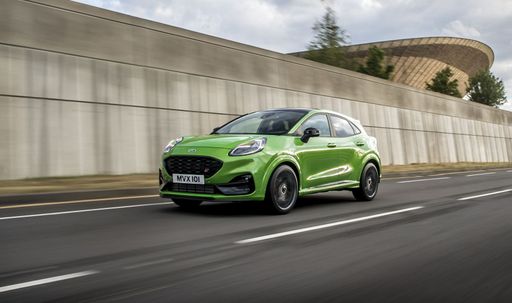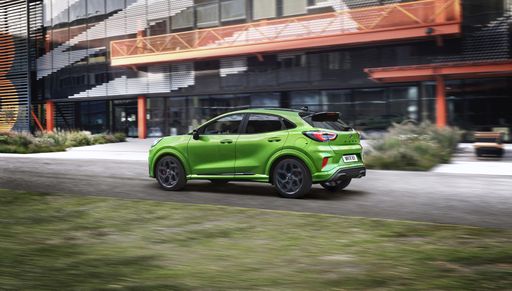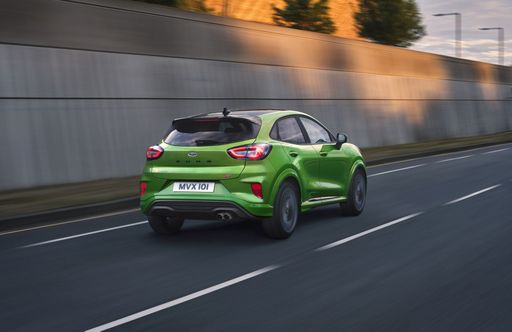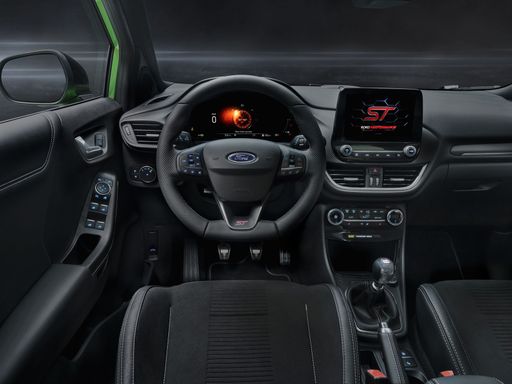Ford Puma vs MG MGS5 EV - Differences and prices compared
Compare performance (168 HP vs 231 HP), boot space and price (24800 £ vs 32600 £) at a glance. Find out which car is the better choice for you – Ford Puma or MG MGS5 EV?
Costs and Efficiency:
Price and efficiency are key factors when choosing a car – and this is often where the real differences emerge.
Ford Puma has a noticeable advantage in terms of price – it starts at 24800 £, while the MG MGS5 EV costs 32600 £. That’s a price difference of around 7791 £.
In terms of energy consumption, the advantage goes to the Ford Puma: with 13.10 kWh per 100 km, it’s slightly more efficient than the MG MGS5 EV with 15.50 kWh. That’s a difference of about 2.40 kWh.
As for range, the MG MGS5 EV performs distinct better – achieving up to 480 km, about 104 km more than the Ford Puma.
Engine and Performance:
Power, torque and acceleration say a lot about how a car feels on the road. This is where you see which model delivers more driving dynamics.
When it comes to engine power, the MG MGS5 EV has a evident edge – offering 231 HP compared to 168 HP. That’s roughly 63 HP more horsepower.
In acceleration from 0 to 100 km/h, the MG MGS5 EV is to a small extent quicker – completing the sprint in 6.30 s, while the Ford Puma takes 7.40 s. That’s about 1.10 s faster.
In terms of top speed, the Ford Puma performs minimal better – reaching 210 km/h, while the MG MGS5 EV tops out at 190 km/h. The difference is around 20 km/h.
There’s also a difference in torque: MG MGS5 EV pulls a bit stronger with 350 Nm compared to 290 Nm. That’s about 60 Nm difference.
Space and Everyday Use:
Beyond pure performance, interior space and usability matter most in daily life. This is where you see which car is more practical and versatile.
Both vehicles offer seating for 5 people.
In curb weight, Ford Puma is evident lighter – 1316 kg compared to 1710 kg. The difference is around 394 kg.
In terms of boot space, the Ford Puma offers to a small extent more room – 523 L compared to 453 L. That’s a difference of about 70 L.
In maximum load capacity, the MG MGS5 EV performs to a small extent better – up to 1441 L, which is about 158 L more than the Ford Puma.
When it comes to payload, Ford Puma slightly takes the win – 469 kg compared to 395 kg. That’s a difference of about 74 kg.
Who comes out on top?
Overall, the MG MGS5 EV shows itself to be shows small but notable strengths and secures the title of DriveDuel Champion.
It convinces with the more balanced overall package and proves to be the more versatile choice for everyday use.

MG MGS5 EV
Costs and Consumption
View detailed analysis
Engine and Performance
View detailed analysis
Dimensions and Body
View detailed analysis
Ford Puma
The Ford Puma is a cheeky compact crossover that blends sporty styling with city-friendly practicality, giving drivers a surprisingly fun and composed ride. With clever storage tricks and a lively personality, it’s a smart pick for buyers who want enjoyment without fuss.
details



MG MGS5 EV
The MG5 EV stands out as one of the few fully electric estate cars available in today's market. Known for its practicality, it offers ample space and a smooth driving experience, perfect for families looking to transition to an electric vehicle without compromising on roominess or comfort. Its sleek design and competitive pricing make it an attractive choice for eco-conscious drivers who value both style and sustainability.
details

|
|
|
|
|
Costs and Consumption |
|
|---|---|
|
Price
24800 - 36300 £
|
Price
32600 - 38600 £
|
|
Consumption L/100km
5.4 - 5.9 L
|
Consumption L/100km
-
|
|
Consumption kWh/100km
13.1 - 13.9 kWh
|
Consumption kWh/100km
15.5 - 16.6 kWh
|
|
Electric Range
361 - 376 km
|
Electric Range
340 - 480 km
|
|
Battery Capacity
43 kWh
|
Battery Capacity
47.1 - 62.1 kWh
|
|
co2
0 - 135 g/km
|
co2
0 g/km
|
|
Fuel tank capacity
42 L
|
Fuel tank capacity
-
|
Dimensions and Body |
|
|---|---|
|
Body Type
SUV
|
Body Type
SUV
|
|
Seats
5
|
Seats
5
|
|
Doors
5
|
Doors
5
|
|
Curb weight
1316 - 1563 kg
|
Curb weight
1710 - 1800 kg
|
|
Trunk capacity
456 - 523 L
|
Trunk capacity
453 L
|
|
Length
4186 - 4226 mm
|
Length
4476 mm
|
|
Width
1805 mm
|
Width
1849 mm
|
|
Height
1550 - 1555 mm
|
Height
1621 - 1633 mm
|
|
Max trunk capacity
1216 - 1283 L
|
Max trunk capacity
1441 L
|
|
Payload
367 - 469 kg
|
Payload
370 - 395 kg
|
Engine and Performance |
|
|---|---|
|
Engine Type
Electric, Petrol MHEV
|
Engine Type
Electric
|
|
Transmission
Automatic, Manuel
|
Transmission
Automatic
|
|
Transmission Detail
Reduction Gearbox, Manual Gearbox, Dual-Clutch Automatic
|
Transmission Detail
Reduction Gearbox
|
|
Drive Type
Front-Wheel Drive
|
Drive Type
Rear-Wheel Drive
|
|
Power HP
125 - 168 HP
|
Power HP
170 - 231 HP
|
|
Acceleration 0-100km/h
7.4 - 9.8 s
|
Acceleration 0-100km/h
6.3 - 8 s
|
|
Max Speed
160 - 210 km/h
|
Max Speed
170 - 190 km/h
|
|
Torque
170 - 290 Nm
|
Torque
250 - 350 Nm
|
|
Number of Cylinders
3
|
Number of Cylinders
-
|
|
Power kW
92 - 124 kW
|
Power kW
125 - 170 kW
|
|
Engine capacity
999 cm3
|
Engine capacity
-
|
General |
|
|---|---|
|
Model Year
2025
|
Model Year
2025
|
|
CO2 Efficiency Class
A, D
|
CO2 Efficiency Class
A
|
|
Brand
Ford
|
Brand
MG
|
Is the Ford Puma offered with different drivetrains?
The Ford Puma is offered with Front-Wheel Drive.
The prices and data displayed are estimates based on German list prices and may vary by country. This information is not legally binding.
